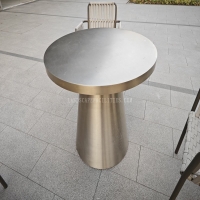Welcome to the website for landscape facilities products and knowledge.
How does the table handle exposure to chemicals like chlorine or cleaning agents?
When investing in outdoor furniture, particularly tables for poolside areas or outdoor dining spaces, understanding how different materials tolerate chemical exposure becomes crucial for long-term durability. Modern outdoor tables employ various protective mechanisms and material technologies to combat degradation from chlorine and cleaning solutions.
Powder-coated aluminum tables demonstrate exceptional chemical resistance through their baked-on finish that creates an impermeable barrier. This coating prevents chlorine molecules from penetrating the surface, making them ideal for pool environments where splashing regularly occurs. The non-porous nature of properly coated aluminum means most cleaning agents can be used without risking material deterioration.
Teak wood tables naturally resist chemical damage through their high oil content and dense grain structure. The natural oils within teak create a protective layer that repels moisture and chlorine penetration. While stronger chemical cleaners may gradually strip these protective oils, routine maintenance with specialized teak protectors can restore this natural defense system.
Polywood and synthetic tables manufactured from recycled plastics with UV-inhibitors offer perhaps the strongest chemical resistance. Their manufactured composition lacks the porous qualities of natural materials, creating an effective barrier against chlorine bleach and most household cleaning solutions. The color permeates throughout the material, meaning surface scratches won't expose vulnerable underlayers.
Wrought iron tables require particular attention regarding chemical exposure. While the material itself is durable, the protective coating can be compromised by chlorine and harsh cleaners. Epoxy or powder-coated finishes provide better protection than traditional paint, but still require prompt cleaning after chemical contact to prevent premature corrosion.
For glass tabletops, tempered safety glass resists chemical damage effectively due to its non-porous surface. However, the framework supporting the glass demands equal consideration, as chemical runoff can accumulate in joints and connections. Regular rinsing with fresh water after chemical exposure represents the simplest yet most effective maintenance practice across all materials.
Manufacturers have developed advanced protective technologies including marine-grade polymer coatings, integrated UV-resistance, and anti-corrosion alloys specifically designed for harsh outdoor environments. Understanding your table's material composition and following manufacturer-specific cleaning recommendations ensures optimal longevity despite regular chemical exposure.
Related search:

Recommendation
Outdoor Metal Table - Classic Outdoor Furniture, Stainless Steel Table, Durable and Reliable